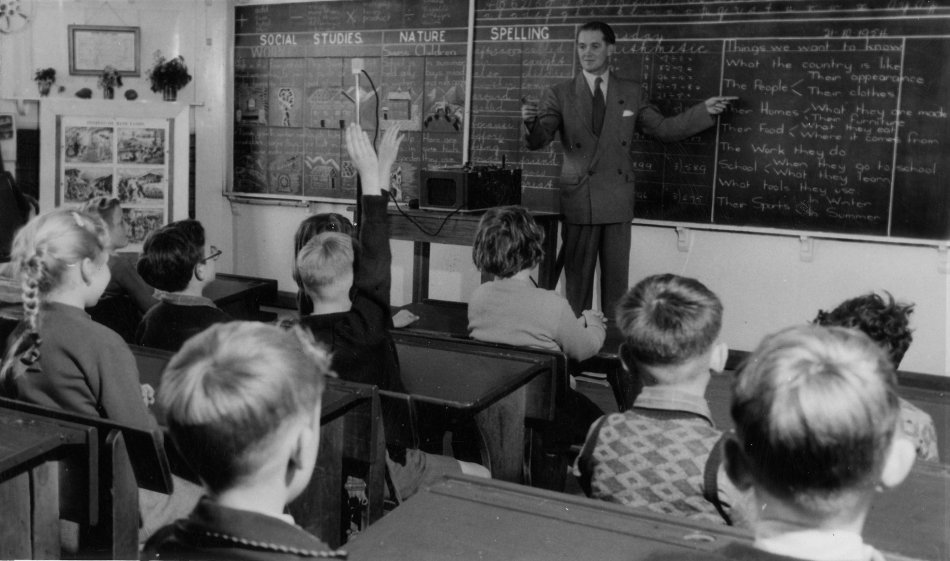Teacher in a Strange Land: The Demise of Genuinely Public Education
“Censorship reflects a society’s lack of confidence in itself. It is a hallmark of an authoritarian regime.”
Potter Stewart, Supreme Court Justice
There is no more local-politics issue than public education.
From Mom gossip about teachers, watching Little Leaguers play, to intense competition for valedictory honors with all the teenaged strivers loading up on useless AP credits—any community’s buzz continually includes trash-talking the local public schools.
The charter school movement tried to take advantage of this, co-opting public education by taking its best features (it’s free, it’s local) and blending them with private school features (selectivity, glossy PR). This has resulted in more waste, fraud and abuse—the very things public schools were accused of, before charters were even invented. In the process, charters drew significant resources away from genuinely public schools.
This is, of course, old news. Charters, vouchers, unhappy parents, ‘education savings accounts’ and court decisions shifting resources away from common schools have been with us for more than a century.
My first political activity, in fact, was phone-banking against a voucher initiative in MI in 1978 (it went down, 3 to 1—like two subsequent voucher proposals). The first time I went to a heated school board meeting, to defend my district’s well-designed sex education curriculum, was even earlier.
Public education has always been under-resourced, contentious and subject to the community it serves. The people who work in public education have always been underpaid, but generally aspire to improve society by helping kids. There are exceptions, of course, but years of history and research bear this out.
You might think I’d be used to this, what with all the banned books, slashed programs (often my own) and vehement parent rhetoric in my personal past. You might think I would be applying the evergreen ‘this too will pass’ theory to what’s happening today, confident that the pendulum will swing, the pandemic angst will fade, and we’ll be back to our highly imperfect normal: public education under siege, but still standing.
It’s taken some time for me to come to this opinion, but I foresee the end of what we currently call public education.
The tipping point is a global pandemic—but the great, battered ship of public ed has been taking incoming fire for a long time. Chunks of its initial purpose and mission—an educated citizenry, democratic equality, a broad introduction to the real world and the humanities—have been regularly chipped off. Something new and malevolent, however, has taken root: an overt push to use public education and already pissed-off parents to win elections.
Today, NPR posted an article entitled ‘Teachers are on the Front Lines in January 6th Culture War.’
It’s a pretty good piece, featuring an array of teachers and curricular experts discussing the difficulties of teaching current events on the anniversary of the January 6th insurrection, after the nation and the Republican party has had a year to, you know, just get over it.
There are brave teachers in MA and MT who are planning to show news videos and discuss the root causes and eventual outcomes. But there’s also a special ed teacher (and regional chapter chair of Moms for Liberty) in Indiana, who’s sticking to math and English, in an effort to be ‘unbiased.’
Unbiased against what? Protecting the rights of camo-clad faux-military marauders to despoil the U.S. Capitol and threaten the lives of Members of Congress? Not willing to sway student thinking about the peaceful transfer of power? Trying to stay neutral on the topic of domestic terrorism?
Just whom are we censoring here? And whom are we protecting?
The story ends with a quote from a middle school teacher, Dylan Huiskan: Not addressing the attack is to suggest that the civic ideals we teach exist in a vacuum and don’t have any real-world application, that civic knowledge is mere trivia.
Veteran public school teachers like me have spent decades developing real-world content discipline applications for our students. We have fought against sterile data-driven education, the relentless pursuit of test scores, the pushing Science and Social Studies and the Arts out of the curriculum. We’ve been trying to DE-trivialize education, professionalizing our own work in the process.
But now we’ve got teachers who think their colleagues are indoctrinating students, by showing them actual live news footage, or discussing an event that happened within their short memory and has huge impact on their own futures as American citizens.
Things are falling apart. We have been crushed by an unexpected medical disaster. One of our two political parties has gone off the rails. Civility is dead—and oh yeah, the planet is fighting back after years of heedless neglect.
And now, we’ve decided to warn teachers—teachers!—not to tell the truth.
As a blogger, I have repeatedly asserted the truism that American schools, often the target of political and media scorn, merely reflect the communities they serve. If that is true—and if democracy is indeed threatened by the events of 2020 and January 6th, then our public schools are threatened as well.
Once, years ago, I wrote a blog using the phrase ‘data Nazis’ and a friend I respect, and trust, chastised me. Use logic and facts, he said. You weaken your arguments when you oversell and hype the danger.
But maybe the next Civil War is here. Maybe public schools will become a tool for the wrong side:
Nobody wants what’s coming, so nobody wants to see what’s coming.
On the eve of the first civil war, the most intelligent, the most informed, the most dedicated people in the United States could not see it coming. Even when Confederate soldiers began their bombardment of Fort Sumter, nobody believed that conflict was inevitable. The north was so unprepared for the war they had no weapons.
Is that overkill? Unclear.
But if it’s not—what are our weapons against losing genuinely public education?

This blog post has been shared by permission from the author.
Readers wishing to comment on the content are encouraged to do so via the link to the original post.
Find the original post here:
The views expressed by the blogger are not necessarily those of NEPC.
